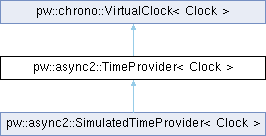A factory for time and timers.
This extends the VirtualClock interface with the ability to create async timers.
TimeProvider is designed to be dependency-injection friendly so that code that uses time and timers is not bound to real wall-clock time. This is particularly helpful for testing timing-sensitive code without adding manual delays to tests (which often results in flakiness and long-running tests).
Note that Timer objects must not outlive the TimeProvider from which they were created.

Public Member Functions | |
| Clock::time_point | now () override=0 |
| Returns the current time. | |
| TimeFuture< Clock > | WaitFor (typename Clock::duration delay) |
| TimeFuture< Clock > | WaitUntil (typename Clock::time_point timestamp) |
| virtual Clock::time_point | now ()=0 |
| Returns the current time. | |
Protected Member Functions | |
| void | RunExpired (typename Clock::time_point now) |
Private Member Functions | |
| virtual void | DoInvokeAt (typename Clock::time_point)=0 |
| virtual void | DoCancel ()=0 |
Optimistically cancels all pending DoInvokeAt requests. | |
Friends | |
| class | TimeFuture< Clock > |
|
privatepure virtual |
Optimistically cancels all pending DoInvokeAt requests.
Implemented in pw::async2::SimulatedTimeProvider< Clock >.
|
privatepure virtual |
Schedule RunExpired to be invoked at time_point. Newer calls to DoInvokeAt supersede previous calls.
Implemented in pw::async2::SimulatedTimeProvider< Clock >.
|
overridepure virtual |
Returns the current time.
Implements pw::chrono::VirtualClock< Clock >.
Implemented in pw::async2::SimulatedTimeProvider< Clock >.
|
inline |
Queues the callback to be invoked after delay.
This method is thread-safe and can be invoked from callback but may not be interrupt-safe on all platforms.
The time_point is computed based on now() plus the specified duration where a singular clock tick is added to handle partial ticks. This ensures that a duration of at least 1 tick does not result in [0,1] ticks and instead in [1,2] ticks.
|
inline |
Queues the callback to be invoked after timestamp.
This method is thread-safe and can be invoked from callback but may not be interrupt-safe on all platforms.